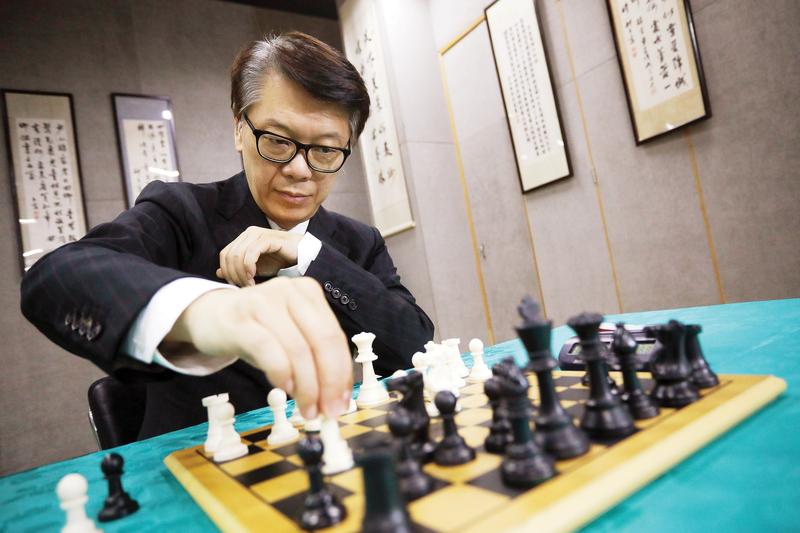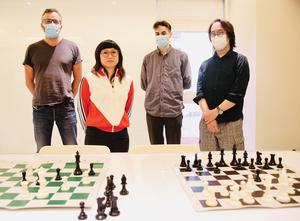A dedicated group of chess enthusiasts are trying to popularize the game in Hong Kong. Neil Li reports on the city’s small but steadily growing community of chess players.
 Robin Lai, vice-president of Hong Kong Chess Federation, says the game has attracted an unprecedented number of, mostly young, people in recent years. (CALVIN NG / CHINA DAILY)
Robin Lai, vice-president of Hong Kong Chess Federation, says the game has attracted an unprecedented number of, mostly young, people in recent years. (CALVIN NG / CHINA DAILY)
Every Sunday, intense battles take place in a nondescript grey office building in Causeway Bay.
White moves bishop to b4.
Black counters with queen to d4.
White’s Bishop is in a bind now. It will be taken if it stays put, but it can’t move to a5 or c5 because of Black’s pawn on b6. Moving backward to c3 won’t work either as Black’s queen is on d4. It can move forward to e7 and into the opponent’s territory or the bishop can be sacrificed to divert attention away from White’s knight on g5.
Welcome to Hong Kong Chess Club.
Playing chess socially
Cheaulyn Ng set up Hong Kong Chess Club around three years ago. She had felt that Hong Kong lacked a place for social chess, unlike in Australia where she grew up and where there was basically a chess club in every suburb. A quick search on the internet shows that there are only a handful of chess clubs in the city. However, the majority of them are geared toward teaching the game to children rather than offering a place to people who might like to play on a regular basis, and outside of a tournament setting.
The first iteration of the chess club Ng had started in Hong Kong came to a close when she went to live elsewhere. Before it ended, the club had close to 50 members. After Ng returned to live in Hong Kong, she revived the club again in October 2020, wishing to continue her work toward creating a like-minded community of chess players in the city.
“Currently it’s a small group, which is fine by me, as we want to make sure that everyone is of around the same playing level and has the same purpose for coming to the chess club. We’re not coming here strictly for social reasons. We want people to have fun while playing chess, as well as improve their game,” Ng says.
 Hong Kong Chess Club founder Cheaulyn Ng sees to it that the club members are of a certain standard and are looking to fine-tune their skills rather than simply socialize. (RAYMOND CHAN / CHINA DAILY)
Hong Kong Chess Club founder Cheaulyn Ng sees to it that the club members are of a certain standard and are looking to fine-tune their skills rather than simply socialize. (RAYMOND CHAN / CHINA DAILY)
Chess coach Chris Lam participated in both editions of Hong Kong Chess Club. He found it via the community-centric website Meetup where Ng posts updates on meetings. Lam was looking to get more practice and improve his game. Originally from Belfast, Northern Ireland, he had been unable to find fellow chess players in Hong Kong. The club seemed like an answer to his prayers.
Lam says while in countries like the UK young people are introduced to chess at school, in Hong Kong only some schools encourage playing the game as an extracurricular activity. “I think the penetration is still pretty low,” he says. “A lot of people in Hong Kong are not familiar with the game.”
There was an uptick in interest and discussions about chess on social media near the end of 2020 when the Netflix limited series, The Queen’s Gambit, found favor among many people, regardless of whether they actually played the game. However, Ng believes the chess-playing community in Hong Kong is still rather small and hence has plenty of room to grow.
Getting the word out
According to Robin Lai, vice-president of Hong Kong Chess Federation, chess is more popular in the city than it has ever been.
“There are around 500 to 1,000 children learning to play chess right now. Our inter-schools chess events and junior chess championships are always the highlights of the year. And our federation has over 830 registered players under the Hong Kong flag,” he says. Around 640 of those players fall between the ages of six to 30.
Among them are top players such as 15-year-old Michael Deng, the second-highest ranked active player in the city with a 2138 FIDE (World Chess Federation) rating and the title of candidate master, 17-year-old Crystal Deng, the highest-ranked active female player in the city with a 1914 FIDE rating and the title of woman candidate master, and Daniel Lam, the first Hong Kong male player to win the World Amateur Chess Championship in 2017.
 Cheaulyn Ng set up Hong Kong Chess Club to give those looking to improve their game a platform outside the tournament setting. (RAYMOND CHAN / CHINA DAILY)
Cheaulyn Ng set up Hong Kong Chess Club to give those looking to improve their game a platform outside the tournament setting. (RAYMOND CHAN / CHINA DAILY)
Despite the breadth of local talent and growing interest in chess, Lai points out that the local development of the sport is still behind that of other countries. “Chess is very popular in the US and Europe and it has grown exponentially on the Chinese mainland in a short time. There are many chess clubs there and chess coaches from Chengdu told me that they have around 5,000 kids learning the game in that city alone. The Philippines had the first Asian grandmaster, Eugene Torre, in 1974, but today China is leading, with over 50 male and female grandmasters combined,” he says.
Lai feels there’s definitely more that can be done to promote the sport in Hong Kong. While the local government provides support, such as subsidies for venue rentals, Lai says the federation doesn’t have sufficient funds or staff to promote chess locally. The Chess Federation is aiming to attract more support by attaining International Olympic Committee membership in the near future.
A place to meet and play
Both Ng and Lam feel the lack of venues in Hong Kong also gets in the way of growing chess locally. There aren’t too many spaces in Hong Kong where people could gather to play chess free of charge. Ng hosts the chess club at her music school on Sundays, with several chess boards set up on long tables in two spacious rooms. She asks players for a small donation to cover utility costs while admitting that she’s not been very meticulous about collecting the money.
Lai believes that a good number of chess players in Hong Kong play online, which he believes could be helpful in terms of training, being an opportunity to play against highly-skilled players from around the world. However, both Ng and Lam prefer to play against someone sitting across the table from them.
“I like the psychological aspect (of playing in person). For example, when you play against someone who moves very aggressively, you could feel intimidated if you don’t have the right mindset,” Ng says. “And at the end of the game, we can discuss the game and analyze our moves. With online chess, you can get the computer to analyze the game but you don’t really know what the other person was thinking.”
Ng has recently started a second chess club that caters to beginners. The sessions start with a short introduction on chess concepts, followed by a round of playing the game. It has quickly gained interest, especially from local players, as Ng and her chess club look to continue to make the right moves toward expanding the chess community in Hong Kong.
If you go
Hong Kong Chess Club
www.meetup.com/Hong-Kong-Chess-Club/
Hong Kong Chess for Beginners
www.meetup.com/hong-kong-chess-for-beginners
Hong Kong Chess Federation Limited


